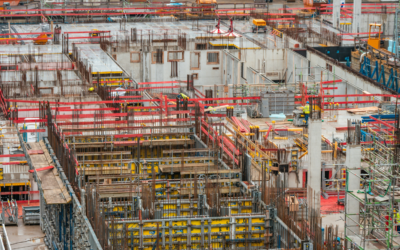If you are planning to undertake a commercial construction project, you should understand the importance of a construction contract. A construction contract is an agreement that legally binds the owner and contractor responsible for building a structure. It outlines the project’s scope, schedule, budget, and all other aspects of the construction process. This document is vital in ensuring that the project is completed on time, within budget and meets all the required standards. In this blog post, we will discuss the vital points to consider when drafting your construction contract.
The Scope of Work
The scope of work outlines the specific tasks that the contractor must complete. This section should be comprehensive and reflect all aspects of the project, including design, construction, management, and post-construction services. The scope of work should also outline the specifications and quality standards the structure should meet.
Project Timeline
The construction project’s timeline outlines the start and completion date of the project. Specific milestones must be identified and well defined throughout the contractual period. A critical path method (CPM) should be used to schedule the project and identify any expected delays that may arise during the construction period.
Payment Terms
Payment terms are crucial in any construction contract. The contract should specify payment milestones and schedules clearly. The payment schedule should be in line with the project timeline and the work completed to date. A clause of non-payment in the contract can be added, ensuring strict adherence to payment schedules and milestones.
Dispute Resolution Clause
Dispute resolution clauses provide the mechanism for resolving any disputes that may arise during the construction project. This clause should specify the method in which disputes will be resolved, whether through arbitration, litigation or other appropriate methods. A loss of contract clause can also be included should this arise.
Termination Clause
A termination clause describes the conditions under which the contract can be terminated. It highlights the provisions for early or immediate termination, the financial impact, and the distribution of obligations and liabilities. It is advisable to consult with a lawyer when drafting a termination clause as it will prevent future disputes and ensure that the contract complies with legal requirements.

Types of Construction Contracts
Construction projects can be daunting and require significant planning, budgeting, and resource management to achieve the desired outcome. In commercial construction projects, it is essential to have a clear understanding of the various types of contracts and agreements involved in the project. These contracts not only define terms and conditions but also protect both parties involved in the construction project.
Fixed-Price Contract
Fixed-price contracts are also known as the lump-sum contract, where the contractor agrees to complete the project with a fixed price. This type of contract is favorable for the clients and helps mitigate the risk of cost escalation. However, this type of contract may not be fair to the contractor as they might have to bear the cost of unexpected situations such as price escalation due to material shortage.
Cost Plus Contracts
In a cost-plus-fixed-fee contract, the contractor is reimbursed for the direct costs incurred during the project plus a fixed fee or profit. This type of contract is beneficial for the contractor as it ensures that they are fairly reimbursed for expenses. Clients favor this type of contract as it offers transparency in the cost breakdown, which helps them assess the expenses and prioritize their budgets.
Time and Material Contract
This type of contract is popular when the scope of work may not be defined explicitly or when the estimated time and materials for the project cannot be calculated accurately. Time and materials contracts are similar to the cost-plus ones but with a more straightforward fee structure. The owner pays the contractor based on the actual time spent and the materials used, along with an agreed-upon profit margin or markup. Under the time and material contract, the client agrees to pay the contractor for the materials used and labor hours incurred during the project plus a percentage or fixed fee for profit.
Guaranteed Maximum Price Contract
In a guaranteed maximum price contract, the contractor agrees to complete the project for a guaranteed maximum price. This type of contract is beneficial for clients as it offers cost control and predictability. In case the contractor completes the project within the budget, they may receive a bonus. However, if the cost exceeds the guaranteed maximum price, the contractor must bear the additional expenses.

Design-Build Contract
Design-Build contracts put the responsibility of designing and constructing the project into one single entity. In this type of cost plus contract, the contractor is responsible for both designing and building the project. This type of contract helps minimize conflicts and delays by having a single point of contact, delivering a more efficient process to the clients.
Turnkey Contract
Under a turnkey contract, the client only needs to hand over the site to the contractor, and the contractor is responsible for the entire project, including designing, constructing, and commissioning the project. This type of contract is beneficial for the clients as it reduces their involvement in managing the project. However, the risk of cost escalation and quality control may limit the use of this type of contract.
Joint Venture Contract
A Joint Venture Contract is an agreement between two or more parties where they come together to work on a project, with the intent of sharing the risks, costs and benefits of the project. Each party bears the responsibility of a specified section of the project, and they share profits or losses based on the agreed-upon percentage.
Subcontracting Agreement
This type of agreement is an agreement between the contractor and subcontractor, where the subcontractor is hired by the contractor to perform a specified portion of work that is explicitly defined in the agreement. The subcontracting agreement is beneficial for the contractor as it allows them to specialize in the domain of work, bringing in better quality or efficiency. Subcontractors benefit from the scaling of work volume and profitability.
Understanding the types of construction contracts and agreements is critical to successful commercial design, construction, and project management. Choosing the appropriate type of contract is one of the first steps in the right direction towards achieving the project objectives. We hope this blog post helps you make an informed decision when selecting the type of contract for your next construction project.

The Benefits of Having a Construction Contract for Commercial Projects
Undergoing a construction project can be overwhelming and stressful. There are many factors to consider when it comes to commercial projects, including the design, construction, and management. It can be challenging to keep everyone on the same page and ensure that the project is completed within the allotted timeframe and budget. This is where a construction contract comes into play.
Legal Protection
One of the top benefits of having a construction contract is legal protection. Construction contracts spell out the legal terms and conditions of the project. This ensures that all parties involved understand the responsibilities, obligations, and expectations of each party. In the event of a dispute, a construction contract can provide legal protection for both parties. It can be used as evidence if there are any disputes, misunderstandings, or legal proceedings that occur during the project.
Clear Communication
Communication is key when it comes to commercial construction projects. Construction contracts are incredibly helpful in facilitating communication between the client, contractor, and other project stakeholders. They provide a forum where everyone involved can communicate about the project schedules, budgets, deadlines, and quality standards. This communication also helps to ensure that all parties are on the same page and working towards a common goal.
Cost Certainty
Commercial projects can be costly, and construction contracts help to ensure that everyone understands the costs associated with the project. A construction contract will include a detailed breakdown of the costs of materials, labor, equipment, and other expenses. This breakdown will also include any change orders or modifications to the project, ensuring that there are no surprises when it comes to the final project cost.
Better Project Management
Construction contracts help to organize and manage the project. It outlines the general project timeline and schedule, defining the critical milestones at different project stages. The contractor can refer to the construction contract to ensure that the project is progressing as planned. Additionally, it provides the contractor protection against any potential scope changes that may result in a financial loss.
Improved Project Quality
The construction contract also covers the quality standards of the project. This means that everyone involved in the project must adhere to specific requirements around materials, workmanship, safety, and quality. The contractor and client can refer to the contract to ensure that the project meets the specific quality standards, which results in a better-quality project.

South Coast Improvement Company
Recognizing that commercial projects can require meticulous attention to detail, South Coast Improvement Company is the perfect choice for your next project. So if you are looking for a reliable improvement company to take charge of your commercial projects, look no further than South Coast Improvement Company. Don’t hesitate – give us a call today and find out how they can help make your next commercial project a huge success!

Conclusion
Construction contracts are essential documents that provide the framework for a successful construction project. Whether you are a contractor or building owner, understanding the contract’s critical areas is vital. The scope of work, project timeline, payment terms, dispute resolution clauses and termination clauses are some of the most important sections to consider when drafting your construction contract.
Therefore, it is advisable to work with an experienced construction contract lawyer who can help you draft a contract that protects your interests and guides you through the entire construction process. Always remember, a well-drafted construction contract is the foundation of a successful construction project.

View Our Work
Aspen Dental
Partnering with The Aspen Group on the construction of a new Aspen Dental facility that’s functional & welcoming for patients & staff alike. South Coast Improvement Company was awarded the construction of a new Aspen Dental facility in Killingly, CT. The...
Springhouse Senior Living – HumanGood
Designed to enhance comfort & functionality. South Coast Improvement company was hired by HumanGood for an interior and exterior renovation at Springhouse Senior Living. Our skilled teamtransformed the 2nd through 5th floor common areas into brighter, more...






